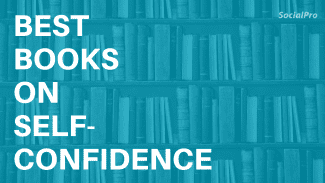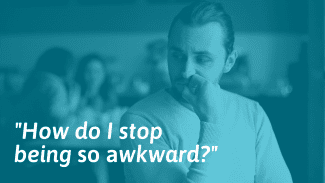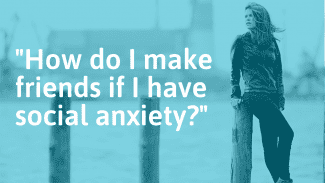A while ago, Viktor and I sent out questions to over 20 000 of you.
We asked you how you deal with social anxiety and nervousness and what specifically you wanted to be better at.
It was fascinating to read.
Here’s what we discovered:
 Our readers are very motivated to improve their conversation skills, social anxiety, self-confidence, self-esteem, and shyness. However, losing touch with friends seems to be a much smaller problem.
Our readers are very motivated to improve their conversation skills, social anxiety, self-confidence, self-esteem, and shyness. However, losing touch with friends seems to be a much smaller problem.
Here’s our most interesting finding:
We saw that almost everyone see nervosity and fear as something negative. They see it as their bodies telling them “Stop! Return to the comfort zone!”.
This is obviously a natural way to see it. But did you know that confident people have a different view on nervosity and fear?
It’s not like confident people never get nervous or afraid. It’s just that in their minds, nervosity and fear is a sign that they’re about to experience and learn something new.
In other words, they see it as a good thing.
- Most see a racing heart and sweating as an omen of something terrible they need to avoid. Confident people see it as a normal response to doing sod to.
- Most would do anything to avoid feeling fear. Confident people can see it as a sign of self-growth.
- Most feel that nervousness is the body’s way of telling you to stop. Confident people see it as a natural process and act despite their nervosity.
How I deal with nervosity and fear
A while ago, I was scheduled for a Skype interview with a popular co-living in NYC.
I was nervous before the interview because I knew how sad I would get if I didn’t get admitted.
Instead of trying to push away my nervosity, I acknowledged it, like this:
“I feel nervous. It’s like a pressure point in the upper area of my chest. It’s natural to feel nervous about this because getting admitted would mean a lot to me, and that’s perfectly fine.”
I acknowledged the feeling, but I didn’t let it control me. The interview went great, and I got admitted.
This method was obviously not the only reason that I got admitted, but it helped me relax and make a good impression.
A MASSIVE amount of studies have shown that when we accept a feeling instead of trying to ignore it or pushing it away, the feeling gets weaker and more tolerable (ref).
Read more: Guide on how to deal with being nervous around people.
Feelings are much like toddlers – it’s not until you give them attention that they stop screaming.
This is a counter-intuitive principle that can be applied to all feelings: Don’t try to fight them – embrace them.
I’d love to hear your comments below!










you are really changing my life and I’m appealing to you to organize more write up about self-confidence, shyness, and fear for me.
This explains why when I try to push away anger I just feel more upset. If only I had known.
Wow! Ur words were just describing my scenario.. Haha! Nice to c someone alike!! Would love to hear from u more in future.. Keep me updated!!
This was really helpful. I didn’t think of it like that. I already feel better.
Wow, I have never thought of it like that before. Thank you very much for this, David! I am going to implement this right now as in the morning I am going somewhere I am nervous about, but all of a sudden I am not feeling like I want to avoid it. I am feeling like I will be learning as I am there and that the nervousness is actually natural. I am no longer feeling awkward about it all as I am understanding myself better. As a matter of fact, I am now looking to it with anticipation, despite my nervousness, as I really do want to become more comfortable in this particular setting. This is life changing.
Hi there, a friend of mine talked to me always when the time she thought that someone is listening and knowing when we talked.
Great!
I feel like friends are leaving me or will leave me and I’ll have to met new people to make friends with I’m not sure how it’s gonna turn out
Wow, I just wanted to say thank you for doing this we need more people like you!
These articles are amazing. Thank you so much????????
Yes, this was something I genuinely needed. I’m thankful for the fresh insight you imparted on nervousness and fear. To be true, I’ve lost many good opportunities due to insecurity, self-doubt, nervousness, and fear. This advice will be a good help to overcome them. Thanks again!
These articles are eye opening and I appreciate that we get this advice free. I feel like a loud weirdo and im always the first to reach out. I just met a great group of women but I looked at their social media and see how accomplished they are and I haven’t done anything exciting or important so now I feel like running from them. I’m afraid they are,and of course they will, ask questions about me amd my achievements, degrees, ect. Im never going to have any friends.
This will definitely help me with what I’m going through right now.
I really am very thankful to your emails they help me alot , i am not very comfortable talking to people and confidence lives like 20 km away from me , but slowly i am working on myself and may be one day i will be there
Thanks David. I’ve improved a great deal in my conversation skills after going through your emails. I’ve been shy and sometimes anxious when speaking since childhood and it keeps showing up. Want to know if I’ve to manage it or it can completely go away with time
thank you this will most likely help me deal with these sort of situations better than before and I appreciate you sending me these messages on this type of stuff because its what I need to work on and this is helping me work on it more, so thank you
hey david! i want to thank you for all your emails. they have helped me so much, and i have been able to talk to the guy i like and actually got closer with him. now we are starting to have a closer relationship. also my relationship with one of my friends is kinda getting weird. she also likes this guy i like and she always gets mad if i talk to him or if i hangout with him. i dont really know how to deal with it.. could you give me some advice on that?
This is exactly what I needed after school today. I had to get up and present to the class. While I waited for my turn the suspense gave me sweaty palms and my heart rate went skyrocketing.
This article helped me realize I need to reconstruct my interpretation of these sensations.
Wow..I really love this method,and you said something that you allowed emotions to take over, and people like or let me say a guy like me if I were to be the one at the interview I will be scared and everything in my head will die down because I will be scared that what if the questions that they should ask me and I did not know it it will be so bad of me and I will be scared so in that aspect what should I do
Sometimes a feeling can overwhelm you, put you into a survival mode FFF.
What do you suggest to do in such situations
It means alot to me david thank u for taking your time and helping others build their self
This seems like a good trick. I will surely try this thanks a lot
Thanks for all your advice David! It is really helpful and I am truly learning a lot. I will try and put this into practice whenever I feel nervous but it is just sooooo hard to not let emotions take over ????. Once I get nervous it’s like my brain completely shuts down and I no longer know how to speak like a human being. This is really affecting every aspect of my life right now so it is really something I am trying to overcome. Can’t wait to hear more tips
I also love reading everyone’s comments, I learn a lot from you guys also! If anyone has learned anything that they would like to share please feel free to comment under my post! Thanks
When I’m at school, we do a lot of group stuff…and I feel like I have no talent or no need to help the team. I think I’m dead weight for them…like there’s nothing I can do to help…I don’t know what do to…I like doing it by myself but I think I’m leaving them behind…I don’t know what to do…should I help the team though I say and mostly do nothing for them…or do I do the stuff by myself and fall behind? I just don’t know…anyone want to comment on my…comment? you don’t have to though…
I feel the same way as you and I am still currently struggling with this. It’s hard to get out of my own head sometimes but I am sure you do have lots of talents that you can use to help your team. I’m learning that we all have our strengths and weakness and we all have something to bring to the table, even if it doesn’t feel like it. Just be open with your team about how you feel and maybe you guys they can accommodate and find a method that works for you.
Hope that helps a bit. Good luck with school!
Confident people use values-based reasoning to make decisions, not emotion-based reasoning.
Imagine the following scenario most of us have found ourselves in some form or another:
”Your alarm goes off, you roll over and see that the alarm reads “5:00 AM.” You glance outside, and while it’s still pretty dark, somehow you just know it’s cold out there—really cold. On the other hand, your bed is so toasty! Which brings you to a decision point: Should you get up and go for that run like you planned? Or hit snooze, roll over, and hopefully hit the gym after work?
After a few back and forths with yourself, you decide that it’s just too cold out there, pull your blankets a little closer to you chin, roll over, and promptly fall back asleep.”
This is emotion-based reasoning. You’ve made a decision based primarily on how you feel, rather than what’s most important to you. Your value was to start exercising regularly to improve your health (and physique, of course!). Your feeling was anxiety over the discomfort of running in the cold and the relief of your warm toasty bed. Ultimately, you decided to stay in bed in order to avoid the discomfort of getting up early and going for a run.
Now, I’m not here to tell you that going for a run at 5:00 AM is good or bad, right or wrong, healthy or not. The point is that you made that decision and then chose to act otherwise. And that’s a problem for your confidence.
When we consistently act in a way that’s contrary to our own values, we erode our trust in ourselves—and along with it, our self-confidence.
Each time you say something’s important, then act contrary to that commitment, you teach your brain that you can’t be trusted and that you’re not reliable. And the biggest reason we all do this is because our feelings tell us something different.
See, our feelings and emotions tend to be oriented toward what feels good in the short-term: Avoiding pain, feeling pleasure, eliminating uncertainty, etc… Of course, there’s nothing wrong with any of these per se. The problem is, the pursuit of feeling good now often comes at the expense of doing good in the future:
It’s hard to eat healthily, keep off weight, and lower your cholesterol if you constantly decide to pursue the pleasure of a second bowl of ice-cream (feelings).
It’s hard to finally write that novel you’ve been dreaming about (value) if you consistently decide to avoid the anxiety of starting a book and choose the easy relief and cheap excitement of video games (feelings).
On the other hand, when we regularly follow-through on what we say is important to us, our brain trusts us more. Which means, the next time we’re faced with something difficult, your brain is likely to respond with confidence (Yeah, we got this!) as opposed to fear (I don’t know… Seems too tough.).
In short, if you want to build confidence, you need to change your relationship with your emotions. Try to see them as potentially useful messengers but never primary decision-makers.
Begin in small ways to consistently follow through on decisions you’ve committed to, each time knowing that you’re building trust in yourself. And when your brain really starts to trust that you’re the kind of person who goes after what’s really important—as opposed to what feels good or easy now—that’s when the confidence comes.
Thanks for the email, I ll try not to be nervous next time and over come the fear…Let me tell you, what happens with me before interview or I am in a meeting and this is my turn to speak now…My throat starts drying, coughing, sometimes even I start sweating a little as well…Hope your learnings would help me…Thanks a lot and have a great day David.
Hi David! I’ve been reading your e-mails for awhile now but have been, well I’ll face it, too nervous to be interactive with them, or you. It’s a little rude now that I think about it, haha. Well I wanted to say I really appreciate this advice, and had, crazily, come to this conclusion about the same time I received this e-mail! I wanted to go a step further with it though. I find it very easy to accept this as common practice. I see it in the people all around me! Though I find it is a difficult task getting it to ‘settle’ with me. I’m a little better with the intangible, so the way I’d explain it is I’m having a hard time rooming with this thought. I live with it doesn’t seem to live with me. I know it, but I’m having the worst time implementing it in my life. So I was wondering if you have any more tips on in the moment situations for when it’s almost too hard to fight the flight response! Thank you again so much, I hope what you have to teach me can also help many other people!
David, thank you for these articles. They honestly help me so much. They’re really clear and they have helped me improve my confidence a lot.
Hi David, hey this sounds a much better way of thinking a stressful situation! For me when a stressful situation comes I often feel overcomed by it , I overthink about all the possible bad outcomes and their consequences and get tangled in my how overthinking. I know this is going to be a process but I’ll try and think it more as a growth situation for myself.
I don’t talk to people that much but you act a lot like me…Not that it means anything at all. but I think you and I could be good friends…though I think I may be breaking the rules because this is not a friends maker place but…my email is in the…email thing, anyway talk if you would like but…you don’t have to if you don’t want to.
Hi David, thankyouu for your great teachings ????
However,vi have a question… You may have wrote an email about this and I just missed it… I don’t know.
Anyway, I’m struggling to find ideas of how to keep a conversation going over text messaging without feeling like a nuisance if the recipient don’t reply.
Can I really tell whether the person is genuinely interested in conversing with me?
I can’t help but think I’m coming across as needy ….